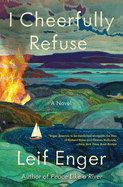
Heartbreaking and terrifying, Leif Enger's I Cheerfully Refuse is a dystopian novel of hope, community, and love. Enger (Peace Like a River, Virgil Wander) constructs an equally complex plot and protagonist in a near-future setting where "the End [is] on everyone's mind." But as Rainy travels around Lake Superior, Enger balances despair with characters who are committed to overcoming evil with good.
Part-time musician Rainy lives on Lake Superior's Minnesota shore with his beloved wife, Lark, the owner of a bookshop "targeted as the merry purveyor of rebellion it unquestionably was." The nation's president is "proudly illiterate"; a warming Lake Superior yields decades-old corpses; infrastructure is crumbling; and those "in search of better" embrace the fatal "Conclusion" drug called Willow. When an act of kindness leads to tragedy, the bereft Rainy launches his antique sailboat on a quest for the spirit of his lost love. Rainy perseveres, escaping threats from both nature and man until his kindhearted decision to harbor nine-year-old Sol--seeking protection from other men, who have murky motivations--places him in deeper danger.
Radical and nefarious characters pursue Rainy's rickety craft, but often-humorous dialogue in the face of this too-credible saga of lawlessness relieves the lurking terror. "Rubicons get crossed for all kinds of petty reasons," Rainy muses as he gambles on a route through a storm. His optimism is rooted in an appreciation of beauty and joy--demonstrated in his descriptions of his deck "embellished with gulls," memories of being "aspiring quixotes" with Lark--assuring readers of hope for salvation for the novel's apocalyptic world. --Cheryl McKeon, Book House of Stuyvesant Plaza, Albany, N.Y.

